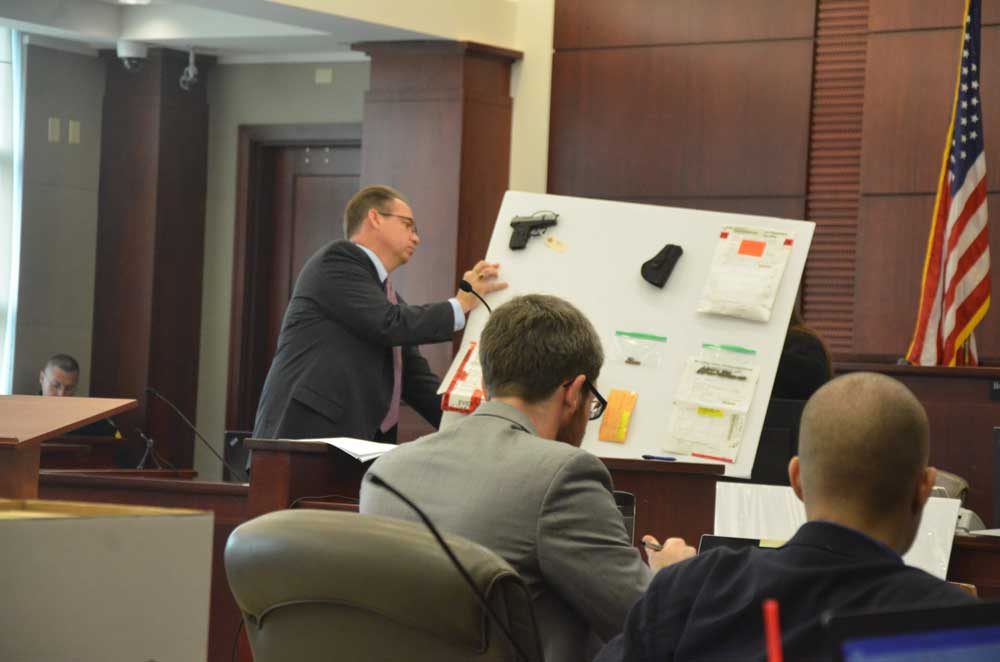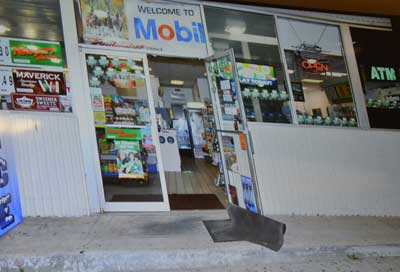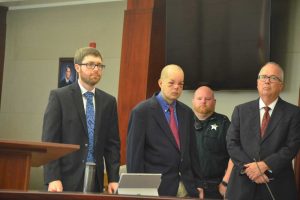
Almost seven months after Joseph Bova shot Zuheili Rosado dead at the Mobil convenience store on State Road 100 in 2013, Bova was living out of his car in Boca Raton, where the Flagler County Sheriff’s Mark Moy and other cops spoke to him one morning.
By then Bova had long fled his Bunnell home at Palm Pointe Apartments. He’d spent four months in Key West, and two in Boca Raton.
Moy had gathered a strong case that Bova was the shooter. Video surveillance from the convenience store near I-95, from the Coconut Car Wash nearby and from red-light cameras still operating at the time formed a triangle of near-certainty around Bova’s identity and location at the time of the murder.
But there was no motive. Nor would Moy walk away from his recorded, two-hour interview with Bova with a motive. The prosecution played the full recording to the jury of eight women and two men in Bova’s trial today, the second and last day of the prosecution’s case. (Assistant State Attorneys Jason Lewis and Mark Johnson are the prosecutors.) It was to be one of two times the jury would hear from Bova. Bova wants to testify Friday.
But so far, the case he and his attorneys are framing around an insanity defense is ringing hollow, largely because of Bova himself: he’s stupendously odd. But his mental acuity, his intelligence, his ability to banter as sharply as he can parry with a detective, seem never in doubt in the two-hour recording the jury heard. It was never in doubt out of view of the jury, either, on Monday, when Bova made an unsuccessful case to Circuit Judge Terence Perkins to represent himself.
So his two attorneys, Assistant Public Defenders Josh Mosley and Matt Phillips, not only have to prove insanity at the time of the crime–a twist on the normally reversed burden of proof, which rests on the prosecution and was in all other regards met by the defense’s concession that Bova is the assassin. But they have to do so with what so far has been a gaping dearth of evidence. The prosecution made that black hole more pronounced as it played the two-hour interview this morning.
Bova denied to Moy having anything to do with the shooting, but with some tell-tale signs that he knew something: after Moy banters with him for nearly half an hour about Palm Coast, Bunnell, cars and a lot of other small talk, Moy broached the subject: “There’s some things that I believe you might be a witness to.”
Bova is assertively pre-emptive. He insists even before Moy explains to him why he’s there and what he’s asking for that “I haven’t seen or heard anything.” It’s a startling admission of non-guilt. Moy of course picked up on it immediately.
“But you don’t know what I’m talking about,” Moy tells him.
Bova repeats that all he’s seen is a fight at one time back in Flagler, nothing else. They banter again. Moy has Bova read his own Miranda rights. (Moy had a search warrant for the car.)

“What this whole thing is in reference to is in reference to a homicide investigation,” Moy tells him, “where a store clerk was killed.”
“Where did this happen?” Bova asks.
“The Mobil gas station.”
“No idea man. It’s terrible,” Bova says.
“I know you were there the day of the incident and you used the ATM machine,” Moy tells him. Bova had gone into the convenience store and taken out $120 about two hours before he returned a little after 10 p.m., his face masked with a t-shirt, to shoot Rosado. She was the only employee on the late night shift. She was less than an hour away from going home and was leaning on the counter, gazing out, when Bova walked in and shot her three times with the 9mm SCCY gun Moy would recover from Bova’s glove box.
“Do you remember anything out of the ordinary, was there anything specific about the store when you went in there? Do you remember any of the clerks?” Moy asked him, referring to the time Bova had gone in to get money.
Bova says no, except that the store smelled. As Moy weaves in more banter to keep Bova relaxed and talking, Bova admits that the images Moy is showing him that night near the store, within moments of the shooting, show his truck. But he says he goes to the beach late at night sometimes, or goes out to get food. “I never did anything,” he says defensively. Then another startling statement: “Do I seem suspicious to you?”
“Maybe you’re in a bad spot,” Moy says. “If you know anything, I just want you to be honest with me.”
“Like I said, I’m from a small town,” Bova says, apparently referring to his roots in Connecticut. “We respect the cops, we respect the law.” Moments later: “I don’t know man, it wasn’t me. You’re scaring me, dude…. I hope you find the person who did it. I’m sure if you look far enough you’ll find that person. You’ve been on the case for a while?” When Moy presses him, ties him to the murder weapon, Bova says he doesn’t want to speak anymore, though minutes later he asks yet another chilling question about Rosado: “Did she die easy?”
Three days later Bova had been arrested and booked at the Flagler County jail on a first-degree, premeditated murder charge. He pleaded innocence, then, after twice being judged incompetent to stand trial and restored to competency, changed his plea to guilty by reason of insanity.
The state finished its case today with testimony from Bova’s previous neighbor at Palm Pointe Apartments, from Moy and from a state weapons technician who analyzed the gun. The neighbor described Bova as “weird,” “manipulative,” “shady,” obsessed with girls (Mosley had to elicit that from him). The defense had claimed Bova worked on his cars late at night, to emphasize his strange behavior. The neighbor was supposed to corroborate that. He didn’t. He said Bova stopped working at or just after nightfall. And he recalled seeing Bova disappear around the time of the shooting in February 2013, though he couldn’t place the day, exactly. “That was the last time I’d seen him,” the 25-year-old witness said.
Mosley didn’t get much out of the neighbor other than emphasize the weirdness of Bova. But there was nothing about Bova hearing voices, talking to walls, talking to himself, though that’s the defense’s claim: that Bova killed Rosado because voices made him do it.
And after the state rested and the defense put on its first two witnesses, it didn’t go much better.
The defense’s case started just before 3 today with Albert Esposito, Bova’s landlord with whom Bova claimed he’d have lunch at times. “He wasn’t happy with the area, didn’t seem able to hold a job for a long period of time,” Esposito said of Bova, but nothing more revealing or arresting about his psychological bearings. “Generally a nice boy, he wasn’t difficult to talk to, he just wasn’t focused,” Esposito said. He would grease up the carpet with car parts he brought to his apartment to work on. He used the word “erratic” several times to describe him. “He didn’t like his nose, he didn’t think women liked him.” (In 2013, Bova tried to do a nose job on himself, and at one point put caulk up his nose.)
The defense’s second witness was Bova’s father, Henry. The Bova parents had flown in earlier in the day. Bova could have had a video phone conference with them. His attorneys tried to impress on him the importance of doing so, if only to put his parents at more ease. He refused. Mosley later told the judge that while he had planned to have Bova’s mother testify, she was too emotional and wouldn’t do so. Bova himself told the court: “Please don’t put her on the stand.”

His father was entirely composed and forthright in his relatively brief time on the stand. But as a defense witness, he was more helpful to the prosecution’s case: On cross-examination by Lewis, Bova’s father could not once tie his son to a psychotic episode, to hearing voices, to acting out, to doing anything more abnormal than the oddities of a teenager or young man calling home once a week to ask for money.
“He was a great kid,” his father said of Bova’s youth. He then got into a serious crash when an SUV or a truck struck him at 50 mph while Bova was on a bike. Bova was 13. He had recurring medical issues after that. “He started deteriorating, mentally he started deteriorating, he had constant headaches, dizziness, he was constantly going to the doctor, all the time,” his father said. He attempted suicide and was hospitalized in psychiatric hospitals. (Bova lied on his application for a gun, saying he’d never had mental issues or been hospitalized. The application, turned in to the gun dealer, relies on self-reporting. Neither the gun dealer nor state regulators verified it or caught the lie.)
But Bova’s father also said: “They diagnosed him bipolar and I’m not sure if he was diagnosed schizophrenic or not.” (His judgments of incompetency confirm a diagnosis for schizophrenia, for which he is being medicated.) But for all that, he completed a two-year college degree “with a lot of tutoring.”
In July 2013, five months after he’d killed Rosado, Bova met his parents for a couple of days in Orlando as they visited. His father described him acting strange, to the extent that he once ordered the most elaborate meal on the menu, only to refuse to touch it when it came to the table: he was worried someone might poison him.
But Lewis asked Bova’s father: he was fine except for that food incident? Yes. Did he talk to the walls? Did he hear demons? No.
“His behavior, it could be because he killed someone, correct?” Lewis asked him.
“No.”
“How do you know?
“I don’t know.”
Bova in pre-trials has spoken of hearing voices. Should he take the stand Friday, as he is expected to, he will likely do so again. But that claim for now appears as if it will come down to his own word against all else, a heavy burden to carry if his defense is to convince the jury of his not-guilty status by reason of insanity. The defense is also putting an expert witness–a doctor–on the stand, though it revealed in pre-trial that the doctor will not state outright that Bova was legally insane.
The prosecution through Moy’s testimony established that there’d been no known connections between Bova and Rosado, at least not through Facebook or phone records. But that’s a slim record for a drifter and a store clerk at a high-traffic convenience store a straight shot down the road from Bova’s apartment, at a time when both RaceTrac locations on 100 did not yet exist. Rosado’s family is in court on a civil trial now 6 years old, suing Mohammed Ansari, the owner of the gas station, for not taking proper measures to protect Rosado. The family claims that she had received death threats a week before the shooting. That claim, vague and unproven but for the fact that Rosado is dead, is not a permissible part of the criminal trial.





























Leave a Reply